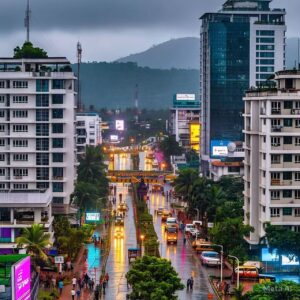
Kerala, often known as “God’s Own Country,” is undergoing a transformative shift with the rise of green tech initiatives that are reshaping its urban areas. With rapid urbanization and the growing threat of climate change, Kerala’s cities, including Kochi, Thiruvananthapuram, and Kozhikode, are embracing sustainable solutions to create climate-resilient infrastructure, reduce environmental impact, and improve overall urban livability. This article explores how Kerala’s green tech revolution is changing its urban landscape, addressing critical issues like climate change, waste management, and flooding.
The Need for Green Tech in Kerala’s Urban Landscape
Urbanization in Kerala has placed immense pressure on its cities, leading to overcrowding, rising pollution levels, and increased vulnerability to climate change. In cities like Kochi, over 90% of available land has been developed, putting the urban ecosystem at risk. As a result, green tech initiatives such as blue-green infrastructure (BGI) are becoming crucial for adapting to climate risks like flooding, rising sea levels, and heat islands. By incorporating water management, flood control, and biodiversity conservation into urban planning, BGI is playing a vital role in restoring the natural ecosystem and enhancing resilience.
The Role of Local Government in Green Tech Initiatives
Kerala’s local governments are at the forefront of driving green tech solutions across its urban areas. Municipal corporations in cities like Kochi and Thiruvananthapuram have embraced sustainable master plans and disaster management strategies to improve climate resilience and safeguard natural resources. By prioritizing green infrastructure in urban development, local authorities are creating sustainable urban environments that reduce environmental risks while fostering growth. Collaborative efforts between municipal corporations, research institutions, and local communities are helping create urban spaces that are not only sustainable but also livable.
Upgrading Urban Infrastructure for Climate Resilience
A key component of Kerala’s green tech initiatives is the upgrading of urban infrastructure to integrate sustainable solutions. In cities like Kochi, the renovation of natural systems such as canals and waterways forms an integrated Blue-Green Infrastructure (BGI) network. These systems play a significant role in controlling urban floods, managing stormwater, and promoting biodiversity.
-
Drainage systems have been upgraded to prevent waterlogging, and stormwater management practices are helping control runoff.
-
The introduction of energy-efficient buildings and smart traffic systems contributes to a greener urban environment.
-
Initiatives like solar-powered streetlights and green roofs are reducing energy consumption and lowering carbon footprints, making cities more sustainable.
These infrastructure improvements not only enhance the environment but also improve public spaces, making them more accessible and enjoyable for residents.
Master Planning for Sustainable Growth
Kerala’s urban master plans are evolving to address the challenges of climate change while promoting sustainable growth. By incorporating climate vulnerability assessments into planning policies, Kerala’s cities are prioritizing eco-sensitive zones and green building norms. These changes help safeguard natural resources while allowing for controlled urban expansion.
Additionally, cities are focusing on floodplain zoning and restoring urban wetlands to protect water bodies, manage flood risks, and support carbon sequestration. These measures are critical in creating a climate-resilient urban landscape that balances development with environmental preservation.
Waste Management and Circular Economy
Kerala’s waste management strategies are increasingly focused on creating a circular economy, where materials are continuously reused and recycled. With decentralized waste management systems, Kerala is promoting segregation at the source, composting, and biogas production to reduce landfill dependency.
Public-private partnerships have led to the creation of plastic recycling units and waste-to-energy plants, helping divert waste from landfills and reducing environmental pollution. Smart waste management systems are also being deployed in cities, using IoT-based monitoring to optimize collection and improve street cleanliness. These initiatives are contributing to a cleaner, greener Kerala while reducing the state’s carbon footprint.
Sewage and Water Management: Innovating for a Sustainable Future
Kerala has made significant strides in improving sewage treatment and water management systems. Cities like Kochi and Thiruvananthapuram have introduced modern sewage treatment plants (STPs) equipped with bio-remediation technologies. These plants treat urban sewage and recycle water for non-potable uses such as irrigation, landscaping, and industrial cooling. This not only reduces pressure on freshwater resources but also helps manage urban waste effectively.
In addition to sewage treatment, Kerala is restoring urban water bodies such as canals and backwaters, which play a critical role in managing stormwater, preventing floods, and improving groundwater recharge. This holistic approach to water management ensures that cities remain resilient to climate-related challenges.
Flood Management and Climate Resilience
- Kerala’s cities are particularly vulnerable to flooding, coastal erosion, and rising sea levels. In response to these challenges, local governments have focused on enhancing flood management systems and implementing climate adaptation strategies.
-
The Future of Green Tech in Kerala’s Urban Development
- As Kerala continues to experience rapid urban growth, the role of green tech initiatives in shaping sustainable cities will become even more significant. Scaling up these initiatives through investment in renewable energy, sustainable infrastructure, and climate adaptation technologies will be essential for meeting the needs of a growing urban population while preserving the environment.
- With local governments leading the way and collaboration between stakeholders, Kerala is set to become a model for climate-resilient, green cities in India and beyond. These green tech initiatives are not just about tackling environmental challenges—they are about creating a better, more sustainable future for residents and future generations.
Conclusion:
More over Kerala’s green tech revolution is transforming its urban landscape by integrating sustainable infrastructure, climate adaptation strategies, and community-driven initiatives. By embracing green technology, smart waste management, and climate-resilient infrastructure, Kerala is setting the stage for a future where urbanization and environmental conservation go hand in hand. With continued collaboration and innovation, Kerala’s cities will serve as leading examples of sustainable urban living in the face of global climate challenges.

Leave a Reply